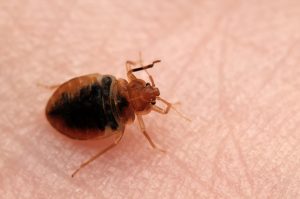Bed bugs are a severe infestation that directly affects the inhabitants in an aggressive manner. The bed bug in both its adult and nymph states can drink what is called a blood meal from its victim causing a small sore that some are allergic to. This blood meal then serves to keep the bed bug alive. However, bed bugs can survive without drinking blood for extended periods and those periods are getting longer while their development is getting shorter, and some are showing resistance to the insecticides used to kill them. One treatment that works consistently is called heat treatment. It will be guaranteed to get the bed bugs out of your home by killing them and the eggs. Sadly the cost is extreme starting in the thousands of dollars and averaging and ten thousand dollars for a single treatment of a normal home of two thousand square feet. This is why it is so important to improve the steam and insecticide treatment, while it takes much longer to get them out it is highly effective and infinitely cheaper than heat treatment. But as bed bugs evolve they are proving to be a difficult insect to exterminate even with the advanced tools we have access to.

A bed bug living in the real world has a life expectancy closer to a few months. They may get lucky and live past the six-month mark but they are not intended to be a long-lived species, their greatest asset is not their lifespan but their rate of breeding. While bed bugs are hunted by almost every type of insect there is, from cockroaches and spiders to ants and centipedes they are likely to die quickly from being eaten, especially if not in their adult phase. Bed bugs can travel quickly but so can many other insects. The process bed bugs go through for breeding is also a grave danger and results in a much higher mortality rate for females. The male does not have a phallus in the traditional sense but instead has a needle, not unlike a hypodermic needle used in hospitals. The male bed bug plunges through a process called radical injection or traumatic insemination. Many females will die during this process meaning the male will have to move on and inseminate a new female.
Bed bugs develop faster in warm temperatures. They prefer a static temperature of twenty-seven degrees Celsius in order to develop in as little as one month. The normal speed of maturation for bed bugs is one to two months. At a temperature as low as eighteen degrees the bed bugs take four months to mature. This means that in temperatures as cold as sic degrees Celsius or below bedbug eggs will not hatch. However, if it warms up again, those same eggs can still hatch. The cold does not kill the eggs but can send them into remission for a time. If the temperature drops below zero then the bed bugs and their eggs will die. The same can happen if it gets too hot. Bed bugs will stop the activity and begin desiccating at temperatures above thirty-six degrees Celsius.
Bed bugs feed on blood, it is necessary for them to feed at least three times a week on a warm-blooded mammal. If they cannot feed they will starve. This once was a way to kill bed bugs but has since become more difficult. Bed bugs have learned to deal with starvation, and while they can easily desiccate without blood meals they can go for more than a year, both adults and late instar nymphs, without blood but do require a certain temperature. In this case, if it is hot they will die much faster but if the house or apartment is cold then they can survive ten times as long.

